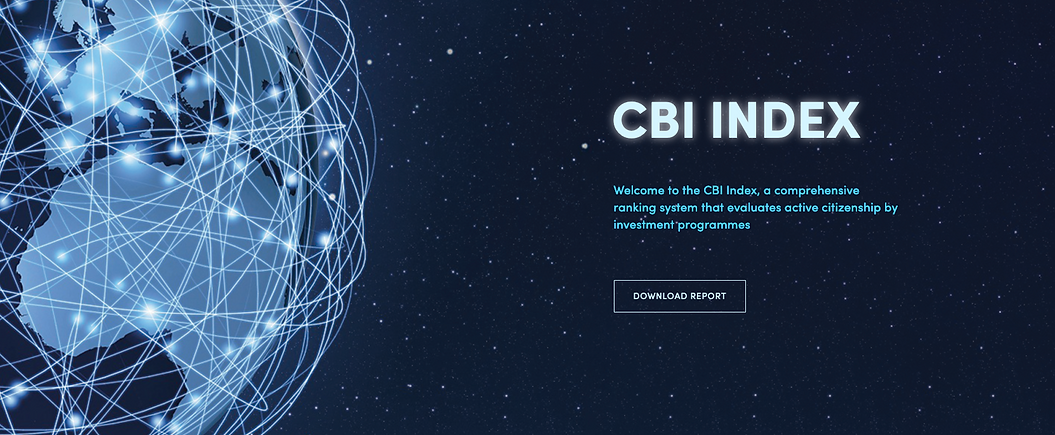
CBI Index.
Custom Research: Independent project for citizenship solutions industry.


Background
In the current era of increased geopolitical and economic uncertainty, interest in citizenship by investment (CBI) programmes, which find their strength in the promise of freedom without the sacrifice of residence, has never been greater. Also known as economic citizenship, CBI is a process that involves the making of an investment into a nation’s economy in exchange for citizenship. The nature of this investment varies from country to country, with most countries giving applicants the choice between contributing to a government-run national development fund, or a real estate purchase. The world’s earliest CBI programme was launched in 1984 by Saint Kitts and Nevis, but today they are administered across the Caribbean, as well as in Europe, Africa, and Asia – allowing prospective applicants to choose a jurisdiction from almost any corner of the globe.
Indeed, the increased unpredictability of governments has turned the market for citizenship from a once dormant industry into a thriving one, providing many countries with a valuable alternative source of revenue in the process. For international investors, CBI offers a way to achieve geographical diversification while at the same time securing a second citizenship as an insurance policy against failing states and encroaching government control.
The Project
OBTAINING OBJECTIVITY
The demand for economic citizenship has risen significantly in the past four years, resulting in a correspondingly large increase in the number of specialist consultancy firms seeking to act as service providers for CBI programmes. Such firms are, however, not always government-approved, and can find themselves using information that is outdated or simply incorrect. The result is a high degree of inaccuracy in much of the information promulgated in the citizenship by investment industry. This provides challenges for prospective applicants to make informed choices. As accurate data is the basis of effective decision-making, the McKay Research team developed the CBI Index – a guide with up-to-date information on all twelve of the citizenship by investment programmes currently in existence.
The objectives of the CBI Index were as follows:
1. Provide a comprehensive ranking system to evaluate and assess all available active citizenship by investment programmes.
2. Ensure objective, unbiased measurement of the performance of citizenship by investment programmes backed by hard data.
3. Facilitate decision-making for individuals considering citizenship by investment, and bring value to the citizenship industry.

PHASE ONE: A PROCESS OF DISCOVERY
In order to build the index, a systematic approach was adopted for the primary and secondary research methods for research, collection and analysis of all data. However, due to the volume of information and available indexes already available, the McKay Research team undertook extensive preliminary research to get up to speed with the state of play in the citizenship industry. Highlights included:
Citizenship industry in focus
Attending meetings, speaking to experts, and analysing industry sources to gain the intelligence necessary for the project design.
Investigating & gathering information
Collecting information on the laws, regulations, and practices of the many jurisdictions currently offering citizenship by investment to qualifying foreigners.
Comparative analysis for CBI Index build
Comprehensive research, review, and comparative analysis of all available indices available to identify approaches, strengths and weaknesses.
PHASE TWO: CONQUERING COMPLEXITIES
A major methodological challenge was to isolate factors, or 'pillars,' that could adequately measure the merits of each programme. To include too few would give an incomplete picture of the programme features and jurisdictional desirability; too many would likely result in an overly convoluted tool with too much information and too few takeaways. Other key milestones during the CBI Index development phase included:
Determining the most powerful and effective metrics to be included as composites for the final index design.
Identifying sources of statistics with complete data sets for all of the CBI jurisdictions under investigation in order to minimise imputation issues.
Making the final selection of the CBI Index pillars: Freedom of Movement; Standard of Living; Minimum Investment Outlay; Mandatory Travel or Residence; Ease of Processing; Citizenship Timeline; and Due Diligence.



PHASE THREE: DATA, DATA & DATA
Arriving at an appropriate rating for each of the seven pillars and sub-components involved a complex combination of benchmarking, statistical, and comparative analysis to allow for an accurate assessment. Data analysis highlights included:
Calculating benchmarks for each pillar and sub-component to ensure an accurate assessment of each programme.
Identifying and extracting the data sets to be used as composites for individual pillars and final score aggregations.
Designing the points scoring system to be used for the CBI Index rating system and devising the averaging and weighting model to be used to ensure user- friendliness.
THE RESULT
After an extensive period of testing, the first edition of the CBI Index was published in June 2017 by the Financial Times group's Professional Wealth Management (PWM), a specialty publication covering the world of private banking and international investment. Many governments with active CBI programmes were quick to recognise the CBI Index as the authoritative industry benchmark against which all programmes would be measured, with some voicing their commitment to improving their rating in subsequent editions of the Index.

The Product
The CBI Index allows two modes of comparison, the first of which is a ranking of the overall performance and desirability of the 12 CBI programmes, while the second, shown in the accompanying table, ranks the countries based on seven factors (identified as ‘pillars’). They include mandatory travel or residence requirements, freedom of movement when using the country’s passport to travel the world and key business destinations, standard of living within the country, minimum investment outlay, timeline to attaining citizenship, ease of processing the CBI application, and the country’s due diligence standards, encompassing both internal and external checks on the applicant, the applicant’s family, and the source of the applicant’s funds. The 'unweighted' relationship of the main pillars with the final scores allows readers to isolate programme attributes and create a strategy focused on their individual priorities.
The CBI Index can be downloaded on cbiindex.com.



